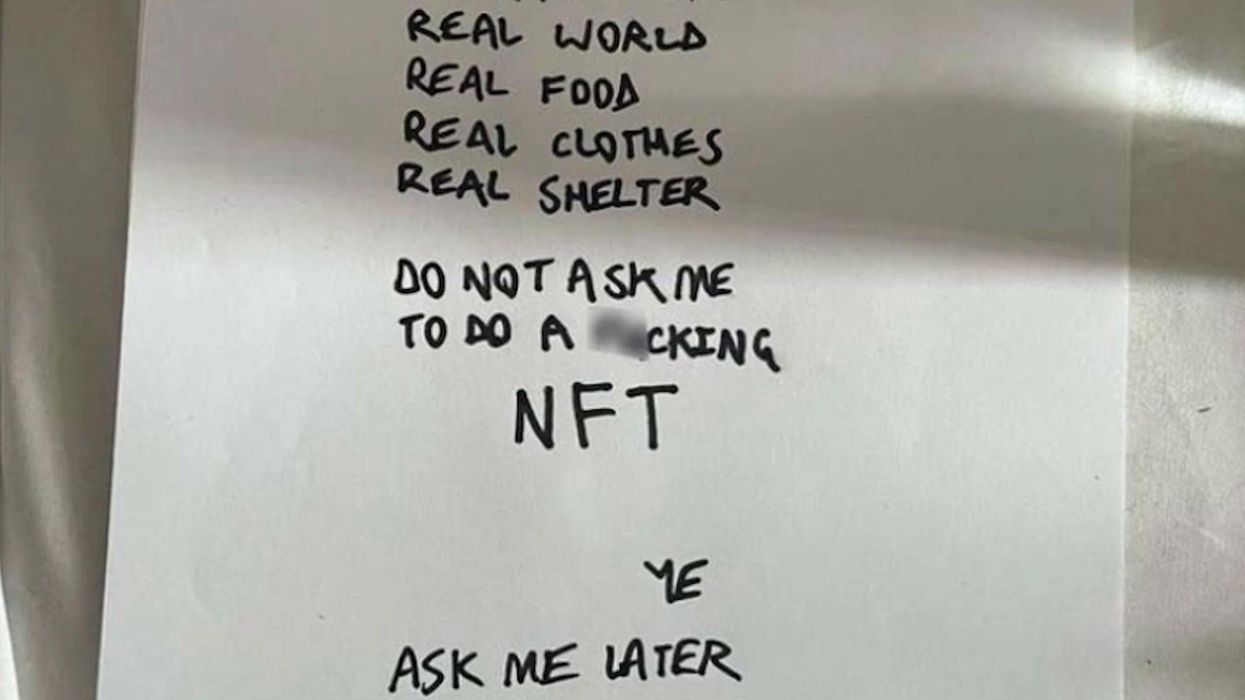Becca Monaghan
Feb 03, 2022
Kanye West won't be releasing NFTs
Independent TV
Non-fungible tokens (NFTs) have been taking over the internet – they've become even more popularised thanks to the swarm of celebrity investors. But now, NFTs have turned the heads of leading conservation charity World Wildlife Fund (WWF) – and people are furious.
For the blissfully unaware, a non-fungible token (NFT) is essentially a 'token' to say you own a digital item.
Ownership is tracked through the blockchain, a system that records information in a way that makes it difficult or impossible to change, hack, or cheat the system. Each NFT will have a different level of value and popularity – think of it almost like a Pokémon trading card.
In an announcement on Twitter, WWF UK revealed they would be releasing 13 endangered species in the form of NFTs, including gorillas, rhinos and orangutans. They hoped that by selling the digital artwork on an “eco-friendly” blockchain, they could raise funds for awareness and to put into conversation work.
However, most NFT transactions rely on a cryptocurrency called Eth, supported by the blockchain Ethereum. According to Statista, a single Ethereum transaction has the same carbon emissions as 140,000 Visa transactions.
Just 24 hours to go... \n\nOur #WWFTokensForNature focus on 13 endangered species \n\nReleasing our NFTs on the eco-friendly @0xPolygon blockchain, each transaction has the equivalent carbon emissions of a glass of tap water.\n\nJoin the discussion: https://discord.gg/wwfofficial\u00a0pic.twitter.com/urFOjZRDE7— WWF UK (@WWF UK) 1643792574
Sign up to our free Indy100 weekly newsletter
While the organisation's tweet claims one transaction on Polygon has the equivalent carbon emissions of a single glass of tap water, Dr Catherine Flick, senior researcher in computing and social responsibility at De Montfort University, explained to Sky News that just because a Polygon transaction uses less Ethereum, it doesn't make it eco-friendly.
"It also requires Eth to buy the NFTs, and future transactions of the NFTs will be reliant on Eth as well," she said. "I don't know of any fully environmentally or climate friendly mainstream NFT implementations that are trustworthy."
She added: "Most of them rely on environmentally problematic cryptocurrencies for transactions or are side-chains to problematic blockchains."
While the intention was there, people of Twitter reacted furiously to WWF's announcement – with some threatening to cancel their donations.
"Horrific idea, sorry to the social team that had to post it," one said. "No Blockchain could even be tenuously described as 'Environmentally Friendly', and even if this one was, you're still promoting the minting and trade of ALL NFT's, which f**k over the habitats you're trying to protect."
Another added: "This is terrible. Everything about this. The blockchain is not eco friendly. Either you’re intentionally lying, or got duped yourselves."
So beyond the arguments of whether or not this is eco friendly, what exactly would I even be buying here?— Lee (@Lee) 1643811456
Whatever @wwf_uk say, it's Ethereum - so fully part of the unregulated cryptocurrency space whose primary purpose in practice is scamming cash from people to pay out the likes of ransomware criminals.\nBad look, WWF.https://twitter.com/wwf_uk/status/1488800080819802116\u00a0\u2026— Kevin F. Quinn \ud83e\udd20 (@Kevin F. Quinn \ud83e\udd20) 1643807537
Guys... I know your social team already knew it'd go this way, so sorry to them in advance, but... reeeeeeally? \n\nPolygon uses Ethereum. It is absolutely not environmentally friendly. This is a massively, massively awful idea.— Ryan Brown \ud83c\udfae (@Ryan Brown \ud83c\udfae) 1643799062
They knew it would go this way because it already went this way last year.https://twitter.com/WWF_Deutschland/status/1455523152600129538?s=20&t=TxkxbqlGJhVk-G64OQkm4A\u00a0\u2026— Callum Uwunderwood (@Callum Uwunderwood) 1643804826
https://twitter.com/agentbizzle/status/1488622145311678464?s=20&t=-IhRjwByW1qHRpcyCf5_FA\u00a0\u2026— Riley L. Hopkins||yugi moto is harboring a monarch (@Riley L. Hopkins||yugi moto is harboring a monarch) 1643810752
make this make sense. Even if this particular arrangement was eco-friendly (it isn\u2019t), you\u2019re still contributing to the widespread adoption of NFT use which is literally killing the planet and the animals you\u2019re purporting to protect— Aoife Wilson (@Aoife Wilson) 1643801770
https://mobile.twitter.com/owenblacker/status/1488907288903569409\u00a0\u2026— Owen Blacker (@Owen Blacker) 1643818216
Polygon sits on top of Ethereum, one of the most energy inefficient blockchain implementations there is, so your claim that this is eco-friendly is nonsense.\n\nEven if it was true, you shouldn't want to associate your organisation with these scam artists.— Paul Scorthorne (@Paul Scorthorne) 1643801345
there are no "eco-friendly blockchains". you've been had. delete this and apologise— \ud83d\udcfb Philip D Kick (@\ud83d\udcfb Philip D Kick) 1643890452
After how badly it went for @WWF_Deutschland last year, you should have known better. Stop promoting NFTs.https://twitter.com/WWF_Deutschland/status/1455523152600129538\u00a0\u2026— DoctorPopular.cash (@DoctorPopular.cash) 1643838385
This isn't the first time WWF have found themselves in hot water.
Last year, WWF Germany released "non-fungible animals" on Polygon, which also stirred up a similar negative reaction.
WWF told indy100: “We are always looking at innovative ways to engage WWF supporters and fundraisers and trial new ideas. This is a hugely expanding area that many other organisations and some charities are already operating in, and we are keen to build up our knowledge.
“We know that NFTs are a much debated issue and that this is an untested market, which is why this was planned as a very small, time-limited test of 13 NFTs, built on Polygon which has negligible environmental impact.
“The money WWF-UK earns from these sales will go towards our vital conservation work across the globe to tackle the climate and nature crisis.
“We will be fully assessing the impact of this exercise including its comparative carbon impact.”
Have your say in our news democracy. Click the upvote icon at the top of the page to help raise this article through the indy100 rankings.
Top 100
The Conversation (0)














